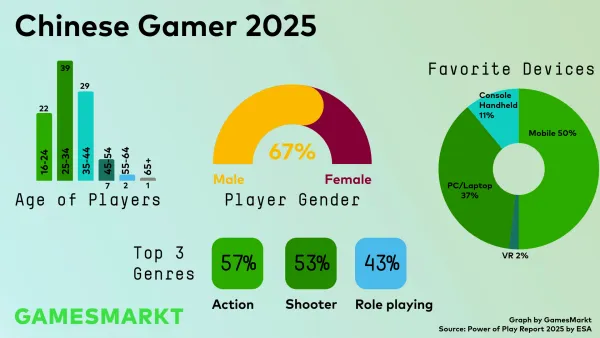Power of Play: China
As part of the Power of Play survey, industry associations also took a close look at the participating countries. GamesMarkt summarizes the results. This time: China.


As part of the Power of Play survey, industry associations also took a close look at the participating countries. GamesMarkt summarizes the results. This time: China.


What makes gamers around the world tick, and how do they differ from country to country? These questions and many more are addressed in the Power of Play study, which was conducted and published by industry associations. In addition to global evaluations, the report also compiles the most important answers to essential questions at the level of the 21 countries that participated.
In China, AudienceNet surveyed a total of 1,501 people aged 16 and older. The results from China differ greatly from those of European countries and also deviate significantly from the global average results. This is already evident in the demographics: in China, gamers are younger and more male than in all of the European countries surveyed. But when it comes to mental resilience, the responses are also significantly different from those in Germany, for example.
The influence of games also appears to be more pronounced in professional and private life in Germany. 49% of Chinese surveyed agreed with the statement “Influenced my career and/or educational path in a positive way.” Globally, the figure is 43%. The statement “Allows me to continue or pursue a hobby or interest that I wouldn't otherwise be able to do” was agreed with by 75% of Chinese surveyed, but by 64% of gamers surveyed worldwide.
Especially when it comes to connecting with other people, games have a different, more important significance in China than in Germany, for example. 93% of gamers surveyed in China play online with others at least once a month. 65% even play in-person with others at least once during the same period. Astonishing 81% use in-game communications. Also interesting: 66%of parents say that playing video games has positively impacted their relationship with their kids. That is more than double of the number from Germany.
Gamers from China are also more positive when it comes to improving skills through games, as the support for the following statements shows.








